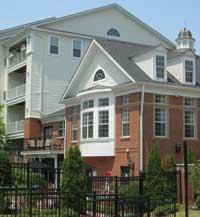Sunny Solution
A Phoenix high-rise goes solar in style.
One Arizona developer is taking advantage of the state’s sunny climate to not only reduce energy costs but add a touch of beauty to its property. Optima Biltmore Towers, a 15-story high-rise condo building in Phoenix, features a solar electric system which helps power the building’s common areas.
“Solar can be beautiful,” says John Balfour, president of PerfectPower, a Phoenix-based solar electric company that designed and installed the system. “We work very closely with the architect, the other contractors, and the builder to come up with something that not only works, but has that aesthetic appeal to it.” The solar panels act as a shading device for the top floor, which features a garden area and pool with 360-degree views of the valley.
Optima is the first high-rise solar project in Arizona, says David Hovey, president of Optima DCH, which designed and built the property. But expect more to follow. While the payback time does typically take six to 10 years, the numbers pencil out with the help of utility rebate programs and a new 30 percent federal commercial tax credit that applies to multifamily buildings.
–Rachel Z. Azoff
Boston Legal
The city boosts affordable housing requirements.
In a push to create more affordable housing, Boston Mayor Thomas M. Menino has made several changes to the city’s inclusionary zoning policy. The biggest change: The city doubled the fees that developers must pay if they do not build city-required affordable housing units as part of their market-rate properties.
Private developers are required to include an affordable component in their residential projects equal to 15 percent of the market-rate units. A cash-out option is available. The city takes the money to help build affordable housing elsewhere. It recently bumped up the cash-out fee from $97,000 to $200,000 per unit for rental housing because the fee was not covering the cost of building off-site affordable units. (For condo projects, the fee is $200,000 per unit or at least half the difference between the price of a market-rate unit and an on-site affordable unit–whichever is greater.)
In the past, the city has preferred built units to cash. “Now we can and expect to start taking money on some higher-end projects,” says Geoff Lewis, senior project manager for the Boston Redevelopment Authority, which adopted the policy. The new policy satisfies the needs of both for-profit builders and affordable housing advocates, adds Lewis.
But one rental market specialist argues that the higher fee will actually discourage developers from building new product altogether. “It clearly makes projects less feasible and will dampen the supply of new rental housing by layering on these government impositions,” says Tom Meagher, president of Northeast Property Advisors, an Acton, Mass.-based apartment market research and consulting firm.
–Rachel Z. Azoff
